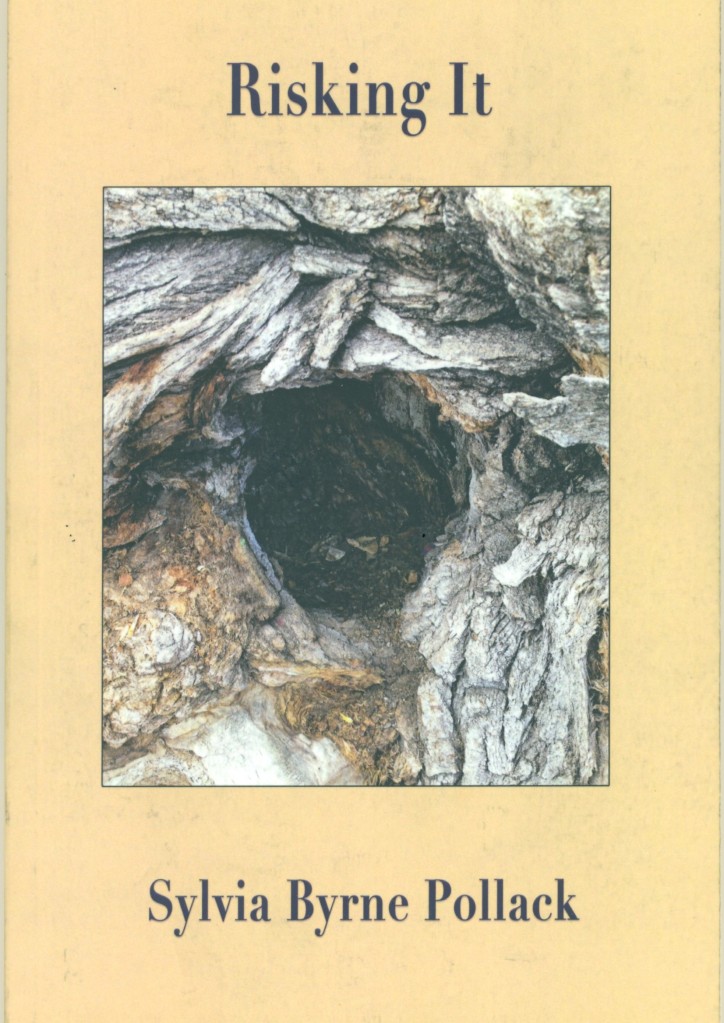The poems in Risking It appear straight-forward but often have twists and word play hiding in them. The poet shows herself to be a person of long experience who admits the bad but lightens it with language. A career in science may have helped to produce this attitude, and certainly added to the rich variety of her vocabulary.
Consider this ending of “Did You Fail Lithium or Did Lithium Fail You?”
. . . . . The inevitable ditch
into which everything falls is filled
with dank water, toads, milfoil.
Word is sent for some desiccant.
Word is sent for a sump pump.
Word returns empty handed.
And the reader is left thinking of all the ways words are unable to make things better.
The poet lives in a world where even such things as stones and tomatoes have personality.
Or even cancer cells. “Girls Gone Wild” is about breast cancer cells who “want/to take a road trip, reach/the lymph highway ASAP,/spend spring break travelling or/ beached somewhere warm like her liver.”
After describing treatment, the poem ends with acceptance:
She came back with a scar her oncologist called
disfiguring but she figured
it was healthy scar tissue, more bonded
than the sorority sisters that hung out there before.
The poet has strong political opinions which she expresses briefly in the voice of an alter ego called The Deaf Woman, avoiding dogmatism, concealing anger. “What the Deaf Woman Cannot Hear” is a poem about the horrors of gas chambers. It concludes:
What comes next in my country?
wonders the deaf woman
the disabled woman
the disposable woman.
Here’s one short poem in its entirety.
Ars Poetica
The poem that declines to be written
because it is self-conscious, shy, cryptic
or shallow is a poem that must nevertheless
be treated with respect—like a wild goshawk.
Don’t try to take off its hood too soon.
Let it rest in the dark as the two of you get
to know each other. Your voice is important.
When the day comes, let it fly, watch where
it soars. If it disappears into the forest, you must
let it go. But if it flies back, feed it.
For Sylvia Byrne Pollack, even not yet written poems have personality. And while this instruction is a lot to ask, the respect that she recommends here is something she gives to everything she writes about.
I hear this book is up for a couple of awards. It deserves one.


 This is a beautiful and gentle book. It does not claim to be poetry, but it is written by a poet and it begins with a powerful image, comparing the children of a large family to pansies, which “are a persistent breed. They take to the same soil, year after year.” If you didn’t read the back of the book it would take you until the third of these finely crafted vignettes to find out what is going on; this is the story of a compassionate woman who needs a babysitter and ends up learning about a sub-culture very different from her own. The young woman she hires teaches her bit by bit about another way of living, of understanding one’s place in the world.
This is a beautiful and gentle book. It does not claim to be poetry, but it is written by a poet and it begins with a powerful image, comparing the children of a large family to pansies, which “are a persistent breed. They take to the same soil, year after year.” If you didn’t read the back of the book it would take you until the third of these finely crafted vignettes to find out what is going on; this is the story of a compassionate woman who needs a babysitter and ends up learning about a sub-culture very different from her own. The young woman she hires teaches her bit by bit about another way of living, of understanding one’s place in the world.